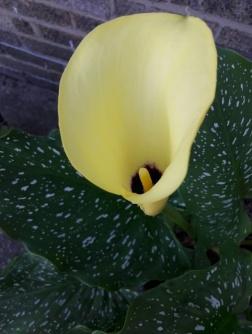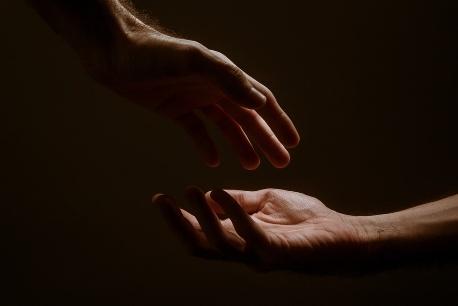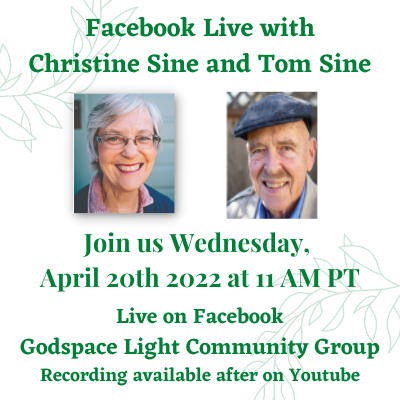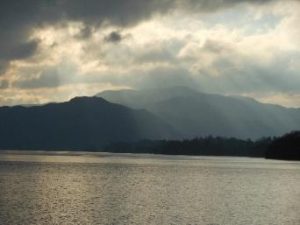by Carol Dixon
Some years ago I was introduced to the Ignatian practice of imagining yourself present in one of the Gospel stories and imagining what one of the characters might have been feeling is a good way to start. My reflective poems for Holy Week and beyond are some of my responses to what might have happened from different perspectives. I hope you enjoy reading them. You may like to read the Passion narratives again yourself and think about which character you identify with today.
Editor’s note: This is part of a series. For Parts 1 & 2, click here.
Part 3 – EASTER DAY
He spoke my name
He spoke my name.
That was how I knew it was him.
No-one ever said my name
like that, before, or since.
I’d had to get out of the city –
the claustrophobic confines
of the upper room, the sombre
atmosphere, forced conversation,
drove me mad; so I stumbled
down the outside stair onto
the quiet paving stones below
and followed my feet.
I wasn’t aware of where I was heading
but found myself back in the garden.
I hadn’t meant to go there
yet when I reached the place I thought
at least I’d be doing something;
replacing the spices, re-arranging
the grave clothes, anything
to keep me close to him.
Then I remembered the stone,
the huge boulder blocking the way,
sealed with Caesar’s insignia,
ringed round with Roman guards.
I couldn’t bear to turn back,
empty hearted, now I’d come so close,
so I pressed on, hoping against hope
for a miracle, just a small something –
a kindly soldier, or friendly passer-by –
so I could see him just once more,
at peace. Not like the last time:
barely cold, broken, lying immobile
while his broken hearted mother wept
as we struggled to do the right thing
and prepare his battered body
before the Sabbath curfew began.
But when I reached the tomb – nothing!
No seal, no stone, no body;
an empty shell with no-one inside.
Oh God! Don’t say they’ve taken him,
defiled in death the body of the Man
I loved; who loved me, and all who
followed, with the passionate love of God.
I looked around frantically and,
in the distance, I espied a figure
in the burgeoning daylight, silhouetted
by the brightening rays of early sun.
Thank God! The gardener.
I hastened to him, falling at his feet:
‘Oh Sir,’ I said, ‘If you know
who has taken him, tell me,
so I can go and get him.’
And then I heard my name,
spoken, as if I’d never heard it before:
‘Mary!’ and I knew. In that moment
I knew everything.
He gently prised my grasping hands
aside and raised me to my feet,
and bade me tell the others
he would see them, back in Galilee.
He spoke my name.
And all my world was filled with joy –
the joy of a new beginning.

| The Garden
‘Very early on Sunday morning, just after sunrise,’ [Mark 16: 2] He watched the trees wafting In some ways, the pain and Even after he accepted the cup, Therefore, in this awakening garden, |
The Gardener
(Tune Traditional: Have you seen my bonny lad?) ‘Tell, if you know where my Lord is laid,’ cries Mary, heart torn with grieving. The Gardener looks on, his heart filled with love. But sorrow stops Mary believing. ‘O Mary, it’s me!’ the Gardener replies, ‘Can you not see through your grieving? A while I was gone, but now I return. Dry all your sad tears, start believing.’ ‘Lord, I believe, I understand now; (the power of death was deceiving), and doubt and despair are things of the past: now I can live truly believing.’ When life is filled with darkness and fear, or the heart is weighed down with grieving the Gardener is near and calls us by name and leads us through doubt to believing. © Stuart J. Brock (Used with permission)
|
The Road to Emmaus
We were walking slowly. Taking our time you might say, for there were about seven miles to go. I’m not sure that I really wanted to return to our lodging at Emmaus. I wanted to stay in Jerusalem with the others. The other women, that is. We needed to think about what had happened to us that morning. What we had seen and heard. Even if none of the men believed us. Perhaps, just perhaps, we need not be in despair, as we had been since Friday evening. But Cleopas wanted to get away. He was heartsick with grief and disappointment. He had been so sure that Jesus was the one who would save us, which for him meant somehow getting rid of the Romans. He wasn’t exactly a zealot, you understand, but if push had come to shove, he was ready to man the barricades under Jesus’s leadership. So he had been desolate since Friday, and he was indignant that the strange message that Jesus had risen – even if he didn’t believe it – should have been given to women.
He couldn’t leave it alone. He mourned the death of our leader. He lamented the lost opportunity. He questioned me about what the men – the angels? – had said to us. I wished he would be quiet, though I didn’t say it. I had never been quite sure about Jesus as a king in this world, leading a military coup. It didn’t seem like him. It contradicted most of the things he had ever said. And I wanted to think quietly about what happened this morning. To ponder in my heart.
Then I realised there was someone walking beside us. I don’t know when he joined us, or where he came from. I didn’t think it was anyone I knew. He seemed to be listening to Cleopas’s diatribe, and my dutiful answers. Then he spoke. It wasn’t a voice I recognised, and yet…
“What is it that you are talking about?”
We stopped and looked at him. Cleopas said, “You must be the only person in Jerusalem that doesn’t know about what’s been happening there these last days.” I smiled to myself. Trust Cleopas to think his concerns were at the forefront of everybody’s mind. I was pretty sure that most of the people who were visiting Jerusalem had kept well out of the way of trouble and only had a hazy idea of the matter. Cleopas continued, “How the authorities took Jesus of Nazareth who was a prophet and a teacher, and our leader, and handed him over to the Romans to be crucified. We thought – hoped that he was the one who would deliver Israel, but we can forget that now. And then, if you please, some of the women in our group,” he carefully didn’t look at me, “went to the tomb this morning and came back with a cock and bull story about him having risen from the dead. I ask you!”
The stranger shook his head and spoke rebukingly – yet I thought there was a smile in his eyes. “How foolish you are. Don’t you understand anything you’ve been told? Don’t you remember what the prophets have said?” Then he set to and explained everything Isaiah and the other prophets has said about the Messiah, and what would happen to him. It made perfect sense. Suddenly, Friday didn’t seem such a disaster. We could understand why it had to happen. I was almost happy. I felt a warm glow inside. It reminded me of that time we sat in a great crowd on the hillside and Jesus told us how we should behave.
By the time he’d finished we had reached Emmaus. As we turned into the house, the stranger seemed to be going on, but Cleopas stopped him. “It’s getting late,” he said. “Come in and stay with us.” So he came in with us. I put food and wine upon the table. We sat down and he picked up the bread. I watched his hands, fascinated. He blessed the bread, broke it, and handed it to us, with that gesture we had seen so many times. We both gasped. It was the Lord. But even as we realised, he just wasn’t there anymore.
We stared at each other. We knew this was something we had to share with everyone. With the whole world! But first… “We must go back to Jerusalem and tell the others,” I said. “ Are you sure you want to? Won’t you be too tired?” He asked.
“Tired! I feel as if I could walk all round the Middle Sea and not be tired.” So we set off back the way we had come. But oh, how differently. We discussed what Jesus had told us, making sure we understood what he meant. We laughed and rejoiced. Cleopas wasn’t grumbling now.
It must have taken us nearly two hours to get back but it felt like a few minutes. We burst into the room where our friends were. “The Lord is Risen!” exclaimed Cleopas. “Indeed He is.” They replied. “Simon has seen him.” Poor Cleopas. He so wanted to be first with the news. But he swallowed his chagrin and told them all that had happened and what Jesus had said to us. © Fiona Middlemist (Used with permission)
(Author’s note: There is a theory that the unnamed traveller to Emmaus was a woman, that is, the wife of Cleopas. I have wondered if she was also one of the women at the tomb that morning. Different Gospels give different accounts of who went on that sad errand. If you look in the previous section of the chapter of Luke you will see that he mentions “Mary Magdalene, Joanna, Mary the mother of James and the other women. On the assumption that this woman was one of them, I have tried to imagine how she viewed this experience of encountering the risen Lord. In John’s Gospel, one of the women at the Cross was named as ‘Mary the wife of Cleopas. Perhaps this was the same woman.)
Part 4 – RESURRECTION LIFE
Thomas
I’ve just spent the worst few weeks of my life!
Everything was wonderful – then it fell apart.
That last supper with Jesus was something special,
despite the undercurrents of unease
and the usual bickering over which one of us –
his closest friends – would be the greatest.
Well, we all failed that one spectacularly I can tell you.
Judas most of all. I still can’t understand why he did it –
betraying Jesus to the authorities.
Peter didn’t come out of it too well either –
denying he ever knew him.
I must admit though at least Peter had the guts to go
with John to the trial (if you can call it that –
stitch-up more like). The rest of us just scattered.
I couldn’t follow him to the Cross, seeing the Lord we loved reduced
to a tortured, bleeding lump of humanity.
The stench of sweat and excrement – of death, hanging in the air.
But it wasn’t that I couldn’t stand.
I suppose I could have steeled myself to watch his stretched out agony,
the pain of listening to them taunting him,
the embarrassment of his being killed as a common felon.
No, it was his love I couldn’t bear.
Still loving to the end. Loving them – his enemies;
loving us – his unfaithful friends. Loving me.
And afterwards – it was all we talked about in the upper room;
every sordid detail, over and over again.
Then on Sunday morning that madwoman from Magdala
came in with such a tale: She’d seen him, talked to him, touched him.
I couldn’t take it in. I just cut and ran.
When I got back the rest of them were at it.
“You’ve just missed him,” they said. “He’s been here.
We gave him the leftovers from supper.”
I thought they were having me on at first, then I realised they meant it.
I told them straight: “You’re all crazy. I’ll never believe it – not unless
I can put my finger in the nail holes and stick my hand in the wound in his side.”
And I turned my back on it and walked out.
[Read John chapter 20 verses 26-31 and find out what happened]

Photo © Jackson David Unsplash
A prayer
Loving Lord, often like Thomas we doubt your power
to rise above the death-like situations
in our lives and in our world.
When we recall the sudden deaths, murders,
painful experiences, and serious illness
of people around us, some of whom
we know and love personally;
When we think of the wars, terrorist bombings,
famines, and other disasters which wreak havoc
around us, we want to run away and hide.
Help us to have the courage
to reach out and touch your scars,
borne for the world, and for us,
so that we may be healed,
renewed, and see your risen life
in the broken people and places
of our world, and acclaim you again
as our Lord and our God. Amen.
| Watcher on the shore
‘There stood Jesus on the beach; but the disciples did not know it was Jesus.’ [John 21: 4] Sitting on the shore He regarded them more He looked at the sea To be able to look on ‘Cast your nets on the
|
At the lakeside
It was the lad – John – who saw him first; Afterwards when everyone was sated and settled ‘Yes, Lord,’ I said again. ‘You know I love you.’ I looked back and saw the lad was following. And I did, to the end…. So can you. |
Acknowledgements
Some of the above have been published by the Iona Community Wild Goose publications who are happy for them to be used for non-commercial purposes with the acknowledgement (C) Carol Dixon Iona Wild Goose Publications – All heaven weeps [Candles & Conifers]; Sister of Mary [Spring] ; At the lakeside [Fire & Bread] all edited by Ruth Burgess.
I have also included two items written by friends of mine with their permission.
 *Note the Special Time!* Join Christine Sine and Tom Sine for a FB Live discussion about Earth Day on Wednesday, April 20th at 11 am PT. You can join us live in the Godspace Light Community group, or catch us later on YouTube for the recording!
*Note the Special Time!* Join Christine Sine and Tom Sine for a FB Live discussion about Earth Day on Wednesday, April 20th at 11 am PT. You can join us live in the Godspace Light Community group, or catch us later on YouTube for the recording!


 Photo
Photo 